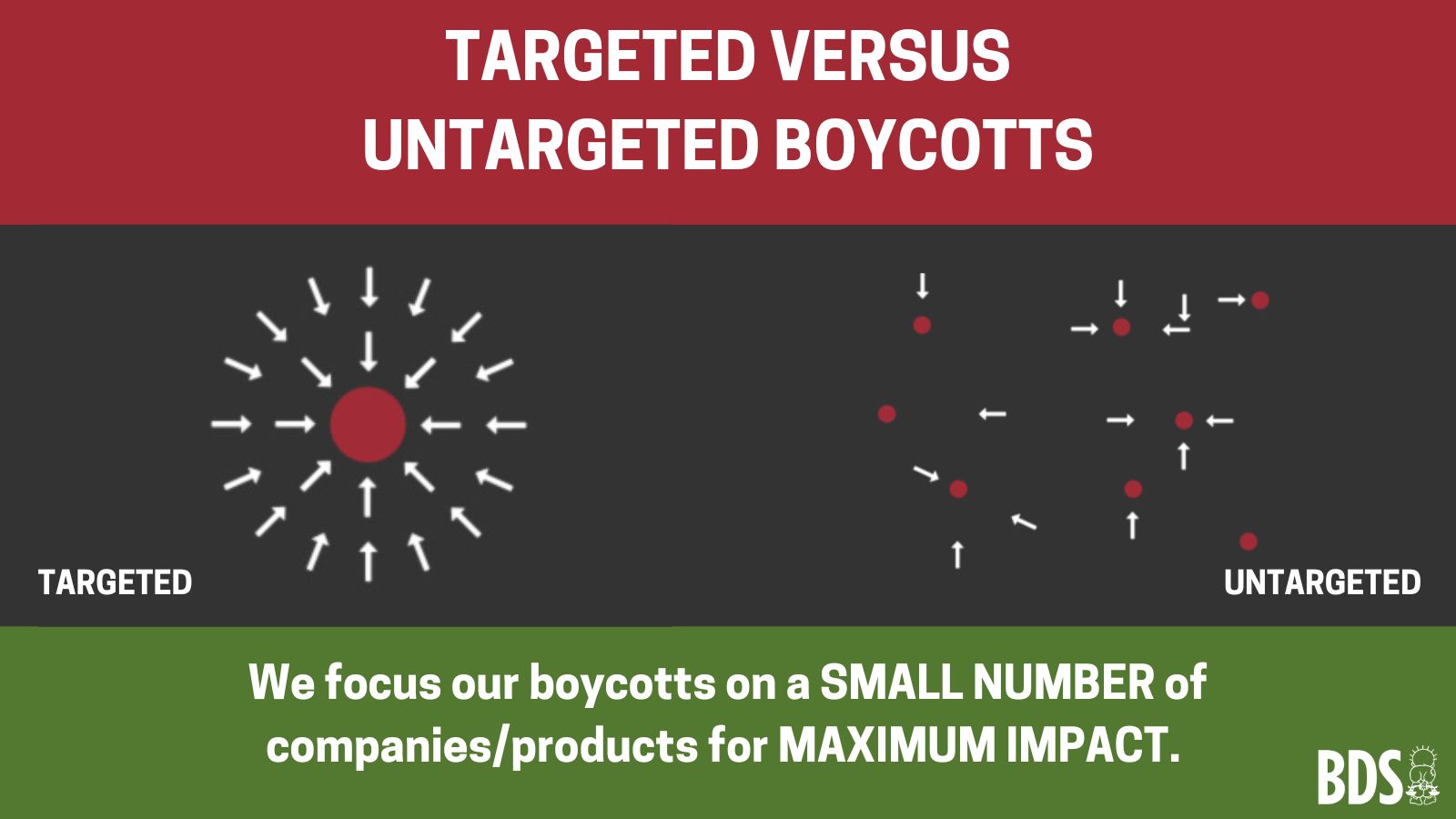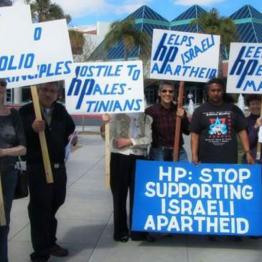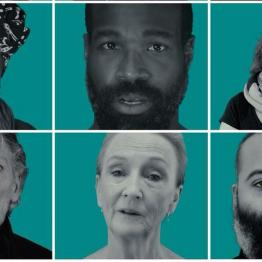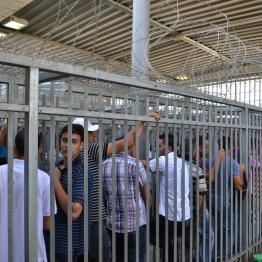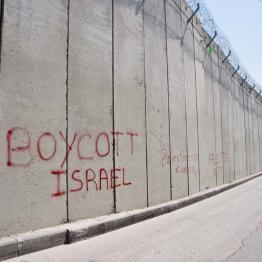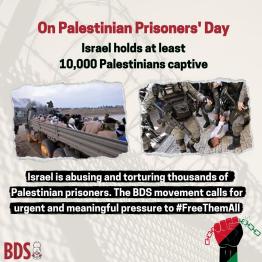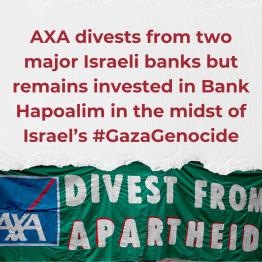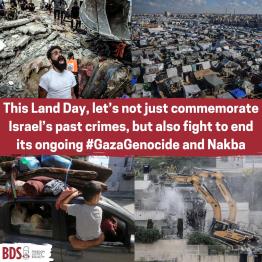BDS Guide to Strategic Campaigning for Palestinian Rights
As Israel continues its genocide in Gaza, a new wave of solidarity with the Indigenous Palestinian people is spreading around the world. The movement to boycott, divest from, and sanction Israel is the most effective way to turn solidarity into impact. Here is how to make your BDS campaign a success.
As Israel’s decades-old regime of settler-colonialism and apartheid continues to escalate its ongoing genocide and ethnic cleansing, a new wave of solidarity with the Palestinian people is spreading globally. Many people are learning for the first time about the historic 2005 Palestinian civil society call to boycott, divest from, and sanction (BDS) Israel until it complies with international law. In this guide, we lay out the movement’s basics, best practices, and some helpful tips and ideas for strategic BDS campaigning.
BDS 101
First, some quick background: The BDS movement was founded by Palestinian civil society in 2005 as a way to exert pressure on Israel to comply with international law and meets three key demands:
-
An end to Israel’s occupation of all Arab lands and dismantling the illegal apartheid Wall;
-
Full equality for Palestinian citizens of present-day Israel; and
-
The right of return for Palestinian refugees.
You can learn more about the history of the BDS Movement, the organizations that make up the Palestinian BDS National Committee, and past and current campaigns at the BDS Movement website.
BDS is the most effective way for us to put our solidarity with Palestinian liberation into action. Israel is only able to maintain its oppressive regime over the Palestinian people and avoid accountability for its genocide against 2.3 million Palestinians in the besieged and occupied Gaza Strip because of international state, corporate and institutional complicity.
BDS is rooted in decades of Palestinian popular resistance to British colonialism and Zionist settler-colonialism. It is inspired by the South African anti-apartheid movement, during which international boycotts and sanctions played a major role in bringing about the eventual fall of apartheid.
A movement for collective action
Many people are personally boycotting brands that have stated support for apartheid Israel, and that’s great – but we want to stress that consumer boycotts are most effective when taken as a collective action, and BDS isn’t just about consumer boycotts. More important than our own personal investments and purchases, which are symbolic gestures but not impactful alone, is working within an organization, union, or coalition to organize effective, strategic campaigns and build power globally to support the Palestinian struggle. So when you see massive lists of dozens and dozens of companies to boycott going around on social media – please keep in mind that the goal isn’t to boycott as many companies as possible, as very few people can feasibly sustain such extensive boycotts over a long time.
The goal is to strategically pick a few targets and exert enough collective pressure to win a campaign – meaning, a specific company stops doing business with Israel, a specific institution divests from complicit Israeli or international companies, or a specific city ends its relationship with the Israeli government or adopts a human rights procurement and investment policy.
There are many different kinds of BDS campaigns to choose from, and you can select the most strategic and achievable targets in your own local context. Consider these examples:
Municipal boycott: a city ends contracts with HP or Caterpillar.
Academic boycott: a university (or department) or academic association ends institutional collaboration with Israeli academic institutions.
Sports boycott: Teams refuse to play against official Israeli teams, or Israel gets suspended from the Olympics or Fédération Internationale de Football Association (FIFA).
Consumer boycott: a grocery store stops selling Israeli fruits and vegetables.
Cultural boycott: a celebrity cancels a performance in Israel, or an event by an Israeli “cultural ambassador” or sponsored by Israel (or anti-Palestinian lobby groups) is canceled.
Divestment: A city, university, church, trade union, or pension fund withdraws its investments in corporations and banks complicit in Israeli apartheid.
As the BDS movement continues to grow at a fast pace, many activists around the world, including in Palestine, often wonder what institution or corporation to target most effectively and how. Given our limited human capacity, we want to be strategic with the targets we select. The BDS movement does not actually launch a boycott campaign against every boycottable event, product or institution, because that would make it impossible to achieve concrete results.
To be strategic, we carefully select our targets and how we intervene in each case. To read about current BDS targets and strategic campaigning, including why some targets are “pressure” targets instead of full-on boycott targets, please take a look at this recent post by the Palestinian BDS National Committee (BNC).
The BDS movement’s strategic target selection criteria are:
-
Level of complicity: The deeper the complicity of the company/institution, the easier and more compelling it is to mobilize BDS pressure against it. There are hundreds of international companies and institutions that are in some way complicit, but not all to the same degree. For example, a company arming the Israeli military is clearly more complicit than a company selling its beauty products in Israel. Understanding how a company or institution is complicit in Israel’s apartheid regime and violations of international law through factual research helps us prioritize our targets.
-
Potential for cross-movement coalition-building: A divestment campaign targeting Chevron, for example, makes much more sense than a divestment campaign targeting a company that only infringes on Palestinian rights, because Chevron is a target of climate justice activists worldwide. Intersectional coalitions are especially crucial to maximize the potential of winning against powerful complicit corporations.
-
Media appeal: If two companies are equally complicit, and we must choose, it is more effective to target the more publicly recognized brand, as that usually attracts more media attention and allows us to educate and reach out to a much larger audience.
-
Potential for success: Even if the above three conditions are met, we don’t launch a campaign against a target unless we have a reasonable chance of success. Success can sometimes just mean reaching a wide mainstream audience and winning their support, rather than actually canceling an event or a contract, but symbolic victories alone are not sufficient. We do BDS because we want to win and build power to affect policy change in order to achieve Palestinian rights ultimately, and not to merely score points and feel good about symbolic gestures. This means forcing the company or institution to end its complicity with Israel’s apartheid regime, for example, through divestment from the Israeli market like French telecommunications company Orange did in 2016. Only through sustained, cumulative, growing and mainstreaming successes can BDS achieve its objectives— which are freedom, justice and equality.
Campaigning to win
Once you and your group or organization (because you absolutely should not be doing this alone!) have carefully researched and chosen a target that makes strategic sense for your local context, don’t just jump out with a public campaign right away. Starting with a soft ask (due diligence) is an often overlooked step that can sometimes deliver us a win right away – and the goal is winning!
For example, meeting with your union’s investment committee to see if they are willing to implement a human rights investment screening policy; privately writing a letter to your school’s procurement manager to see if there is another supplier of computers they could go with rather than HP; or getting grocery store workers to collectively request that the store no longer shelve an Israeli product. You might be surprised by how far good faith engagement, based on sharing accurate information and compelling moral appeals, can in some cases take you, particularly in smaller communities, before escalating to a larger public pressure campaign.
In most cases, however, strategic pressure is the only effective way. For example, when the Portland, Oregon, chapter of the Democratic Socialists of America (DSA) and other allies ran a campaign asking the Portland Trail Blazers to end their sponsorship agreement with the Israeli army’s sniper scope supplier Leupold and Stevens, they first sent private letters to the Blazers organization explaining their concerns and requesting a meeting to talk further about the partnership. This tactic did not work, and they then escalated to a public, year-long pressure campaign, which they won! But they had to make sure to do their due diligence first, as that in itself shows good faith and can win over many bystanders.
You should also begin reaching out to other organizations for endorsement and support. Coalition building is a must in most BDS work. Organizations in your area might be interested in campaigning together on the issue, and other organizations can offer support for your campaign. For example, In the US, the American Friends Service Committee (AFSC) has talented researchers with years of BDS campaigning under their belts and a great database which can help you find reliable information on companies and investment funds. The European Legal Support Center can help BDS groups in Europe ensure that their campaign is as legally sound as possible and may be able to help you face legal challenges that you may run into regardless. Movement media organizations can provide resources on connecting with the media and tips on how best to integrate communications into your campaign strategy, not as an afterthought.
Power mapping is an important part of your campaign as well – who are the decision makers, who is best placed to pressure them, and how can we most effectively do so? Do you have any allies on the inside? What kind of opposition do you think you’ll be up against, and how can you prepare for that ahead of time?
Other important parts of campaigning include creating a media strategy; a public education strategy (for example, hosting informational events like teach-ins); a timeline for escalation of your campaign; and picking strategic dates for certain actions – such as delivering a petition during a board meeting of the company you’re targeting. Is peaceful disruption (sit-in, peaceful occupation, flashmob, collective supermarket action, etc.) a useful tactic to consider, at the right time, in your strategy?
Historically, some of the biggest and most successful BDS campaigns have taken years of strategic planning, organizing, and network building to pull off – so don’t be discouraged if it doesn’t happen for you right away. It’s worth being detailed, strategic and intentional in your planning and outreach. But at this unprecedented time of crisis with genocide unfolding before our eyes, there’s also no reason why a BDS campaign needs to take years. There is great urgency in the work we’re doing right now, and there’s no reason why a city council or your union leadership can’t make a decision to end its complicity right now if the political will exists. If not now, when?
The South African anti-apartheid movement organized for decades to gain broad international support leading up to the fall of apartheid; and apartheid did fall. Freedom is inevitable. The time is now to take action to join the movement for freedom, justice, and equality in Palestine.

